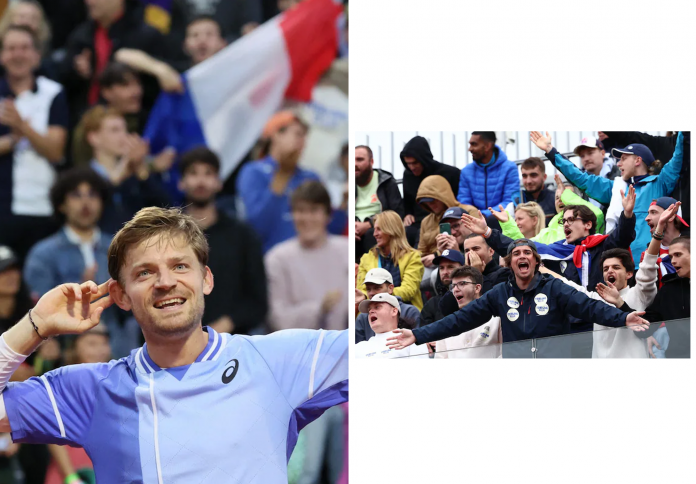As the French Open kicks off on the iconic Parisian clay courts, tension is mounting—not only among the players but in the stands as well. Over recent years, Roland Garros has gained a reputation for its fervent and often unruly crowds, whose behavior is making life increasingly difficult for some of the sport’s finest athletes. What was once a lively, passionate atmosphere is now straying into territory many players find hostile and distracting.
The rise of rowdy crowds at Roland Garros
The French Open has long been known for its passionate supporters, especially when a home player takes to the court. But in recent seasons, this enthusiasm has sometimes crossed the line into aggressive and unsportsmanlike conduct. Belgian veteran David Goffin vividly recalled his experience last year, when he endured relentless verbal abuse for three and a half hours, climaxing with a fan spitting chewing gum at him after his five-set victory over France’s Giovanni Mpetshi Perricard.

“It’s becoming football,” Goffin lamented, warning that the scene was turning into one rife with hooliganism and disturbances. His concerns sparked action from the tournament director Amélie Mauresmo, who introduced a ban on bringing alcohol onto the courts—a measure now extended into 2025. Whether these restrictions can curb the volatile crowd remains to be seen, but the early rounds, where home players abound, are often the most fraught.
French players dominate the early draws, with 27 entrants this year, prompting heightened emotions in the stands. British player Liam Broady described the Parisian crowd as a group more interested in causing trouble than watching tennis. “Some guys go for a drink with their mates and see which players they can rattle,” Broady explained, highlighting the personal abuse and unchecked rowdiness that umpires struggle to manage.
A change in atmosphere and growing player frustration
While tennis crowds have always been lively—often described as having a “Davis Cup atmosphere” with partisan cheering—players draw a sharp distinction between spirited support and personal attacks. The latter is what has soured many players’ experiences at Roland Garros. Tim Henman, who reached the 2004 semi-finals, remembers the French crowds as “lairy but in a good way,” whereas now, he admits, “there are times when their behaviour is questionable.”

Even at tournaments far from France, French fans have been known to cause disruption. At the Australian Open, loud chanting for Frenchman Arthur Cazaux was so intense that neighboring players requested to be moved courtside. Meanwhile, former British No.1 Sue Barker recalls the fans of her era as well-behaved, noting the stark difference with today’s crowd culture. This shift may partly reflect broader societal changes post-Covid, where audiences are more willing to disrupt events to express themselves.
Players have begun to push back. After the gum-spitting incident, Iga Swiatek, the multiple Roland Garros champion, interrupted an on-court interview to call out the crowd’s behavior. “When you scream something during the rally or right before the return, it’s really, really hard to be focused,” she explained. Goffin’s bold stand against the rowdy fans has also resonated in the locker room, with many players applauding his courage.
Balancing fan passion with respect for the game
The debate over crowd control extends beyond the French Open. Former player and current coach Mark Petchey questioned the tournament’s alcohol ban on social media, noting the contradictory message tennis sends to young fans: encouraging enthusiasm yet enforcing silence and strict behavior during rallies. Despite the strict rules, ticket sales remain strong, and the crowd’s passion is unmistakable—often audible well beyond the courts.
As the tournament progresses, all eyes will be on how these restrictions affect fan behavior. Last year’s enforcement was patchy, with many fans still openly enjoying drinks courtside. The tournament may face its toughest challenge if Novak Djokovic faces French wild card Corentin Moutet in the early rounds. Djokovic himself has called the Roland Garros crowd “not easy,” and Moutet is infamous for his gamesmanship, promising a match where crowd energy could reach fever pitch.
Whether the tournament can balance the fervor of its fans with the need for respect and fairness on court will be one of the key stories of this year’s French Open. The players, officials, and fans alike will be watching closely to see if this storied Grand Slam can reclaim the spirit of sportsmanship it once held dear—or if the rowdy crowds will continue to define it.
The French Open’s passion is undeniable, but the challenge ahead is to ensure that passion lifts the sport rather than disrupts it. For the players competing on the red clay, managing not only their opponents but also the unpredictable crowd could be the true test of their championship mettle.










